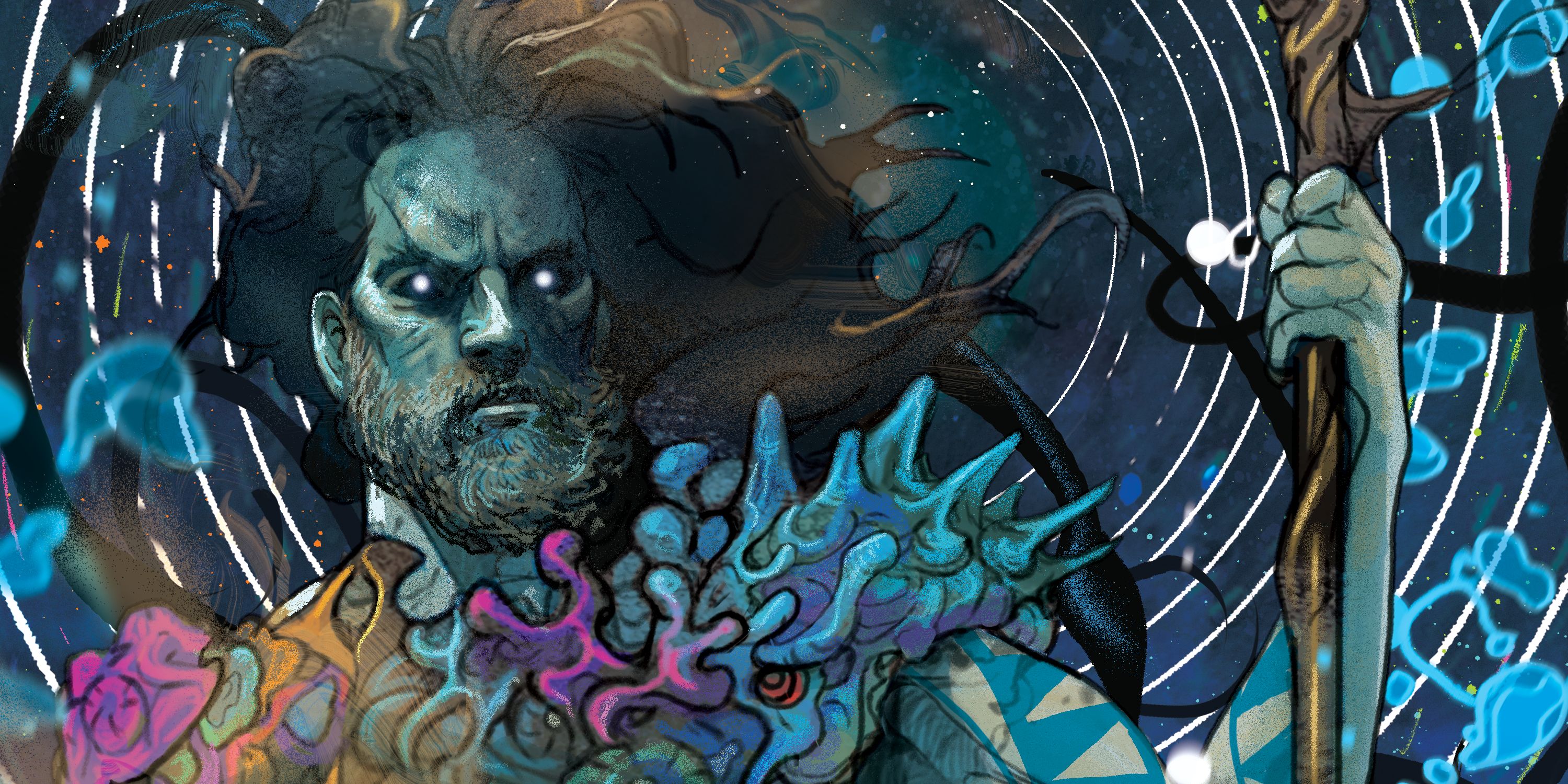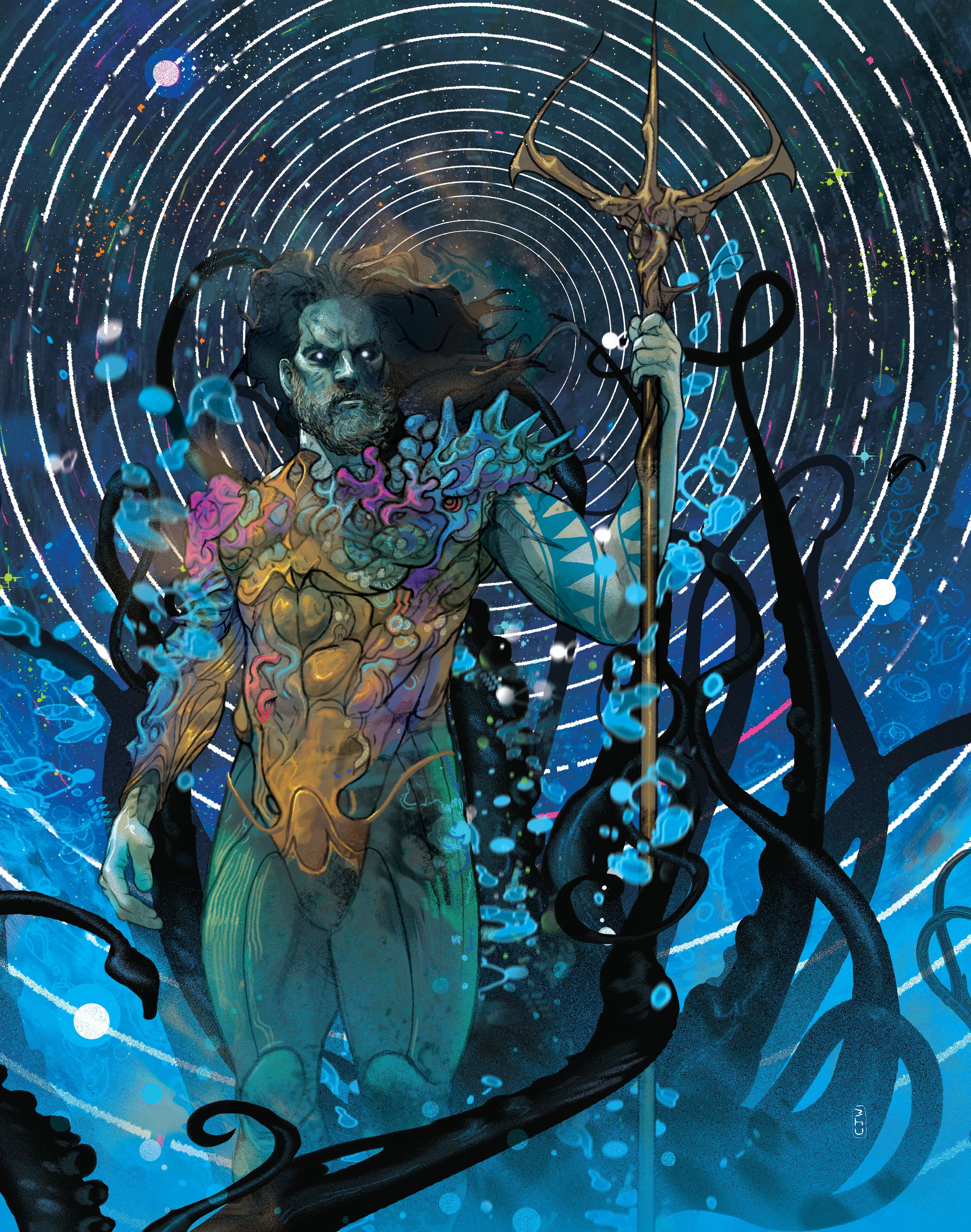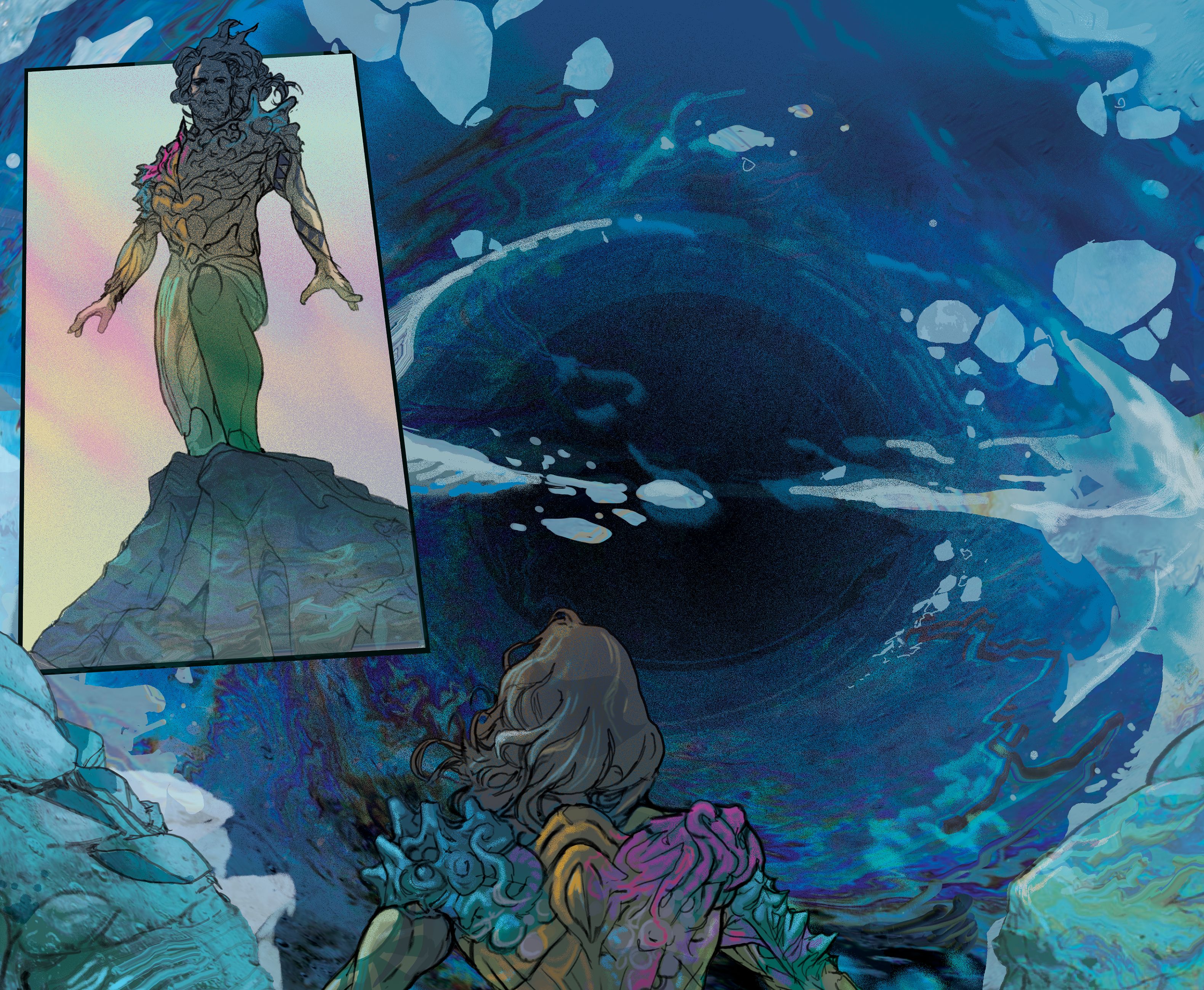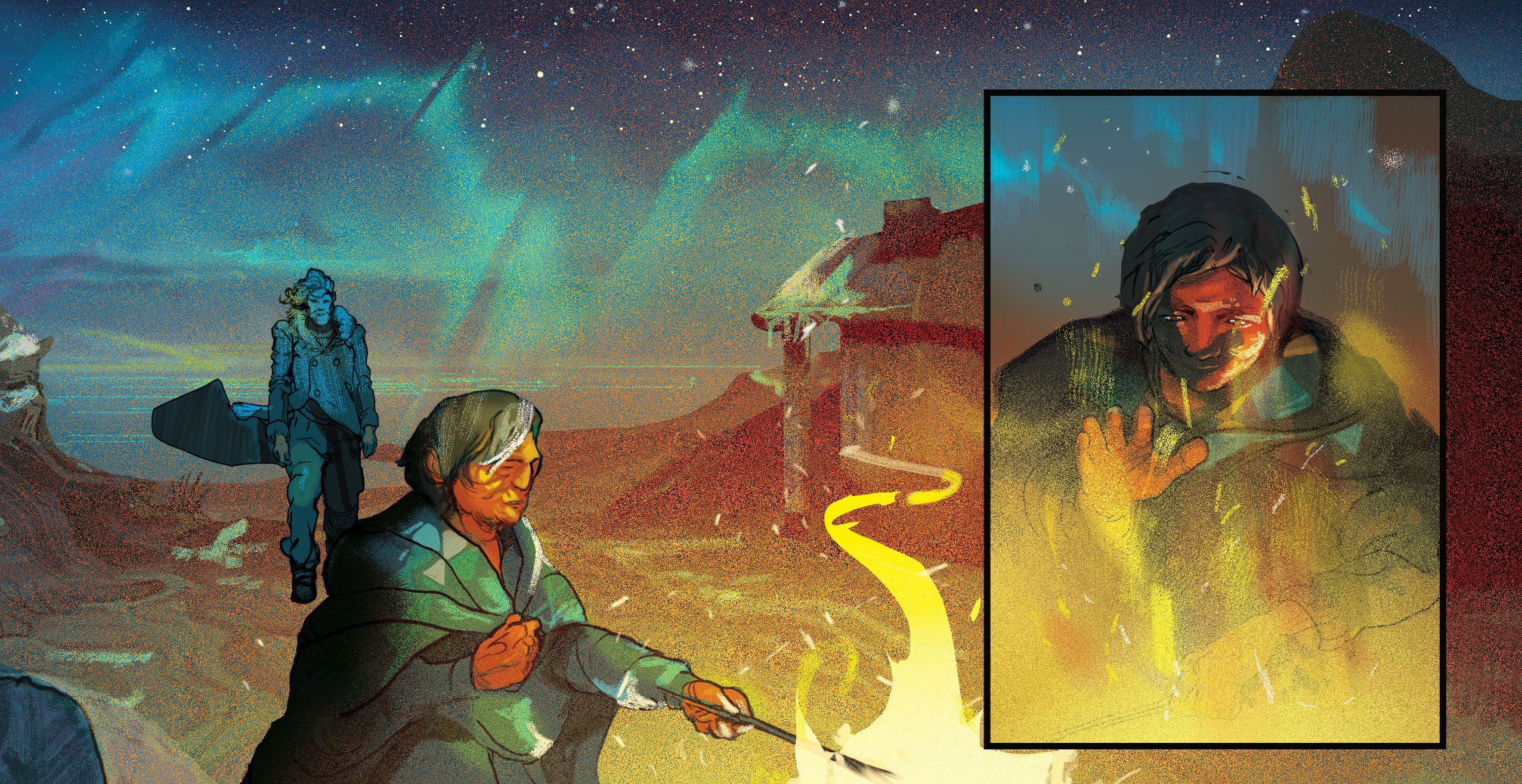Since its inception in 2018, DC Black Label has provided fans with new and exciting interpretations of some of DC's most iconic heroes and given creators the room to experiment with new ideas outside of the main DC continuity. Batman, Hellblazer, and the Suicide Squad have all shined brightly within the imprint. However, many classic characters still haven't made their Black Label debut. At first glance, Aquaman might seem like an unlikely candidate for the imprint, but Ram V and Christian Ward are determined to make a splash with Arthur Curry in their upcoming three-issue miniseries Aquaman: Andromeda.
The series will follow the crew of an experimental submarine called the Andromeda as it ventures into the depths of the Pacific Ocean. Their goal is to research a mysterious structure that has also attracted the attention of Black Manta and Aquaman. CBR recently spoke with V and Ward about how they began working together and their goals for the series. The creators discussed their new take on Aquaman and the challenges of working with Black Label's prestige format.
CBR: We've seen a lot of different versions of Arthur Curry over the years, with different origins, powers, and designs. Which eras did you two draw from for this iteration of Aquaman?
Ram V: I took the approach from the other end. I looked at all of the stuff that had come before and I said, "What can we do that hasn't been done?" I wanted to present something that I didn't think had been done yet. So I don't know if that answers your question or if that's the opposite of the question. I went back and looked at everything to make sure that we were presenting a concept and an idea that genuinely felt fresh and new. Obviously, there have been a lot of great stories. Generally, the Aquaman stuff has tended to veer towards sort of this magic and fantasy route. I wanted to see if we could drop it into a different genre and make it work.
Christian Ward: Even though we are tackling a character who has been around for years, this has felt closer to a creator-owned book. We're really focusing on the story that we're telling and allowing Aquaman to be true to his character, but letting the story kind of shape what he is. That'll become clearer when you read it. I wanted to do something visually that's not been seen, and that's always really difficult, especially for a character who's got such a long legacy as Aquaman.
V: If I can add to that, I think even visually... When Christian and I started originally talking about what we wanted the character to look like, I remember specifically saying, "Let's do something with a Greco Roman, statuesque figure that has been underwater for too long. What would that look like if a statue had drowned underwater and it stayed there for too long?" I think we kind of started with that viewpoint and then built from there. Then Christian brought in influences of armor from some classic films and all of that, but I think even that approach in itself is quite new. I don't think that has been done before.
Ward: Yeah, I knew I wanted to do something with coral. That was always my big thing. I love drawing coral, the idea that coral and things grow and change. It was also a way to bring my kind of color aesthetic into a world and into work and that seemed like a really natural fit.
Ram, you'd mentioned earlier that you drop Aquaman into a different genre. It seems like there are going to be a lot of elements of horror and sci-fi in this series, too. Do you think of this as more of a sci-fi story or a horror story?
V: I think of it as a sci-fi/horror/human character drama set inside a situation that has both literal and metaphoric pressure.
How did you two begin collaborating together on this?
Ward: We've known each other for years. I first met Ram at London Super Comic-Con years ago. Was that 2015? Ram came and introduced himself, and at the time, I think he'd just done Black Mumba.
V: There's a specific story here, Christian. I stood at your table for 45 minutes and heard you dispense wisdom to a first-time artist who was trying to break into comics. I stood there because I had three Xerox copied pages of Black Mumba with me. I was like, "Wow, let me get in on some of this free knowledge." It is affirming and also immensely exciting to then turn around in six or seven years and be working with you. I absolutely admire Christian's work and what he brings to everything he works on.
Ward: Likewise. It's a huge privilege to see you ascend to literal comic godhood. You can read a page of Ram's work and whether it be any one of the Big Two's characters or a creator-owned book, he brings a certain sensibility to it. You know, when you're looking for collaborators, you're looking for somebody who brings integrity and something unique to a story, and Ram does that in spades. So when I was contacted about this book, it was easy to say yes. This is such a cool book. I love cosmic horror. I said, "I'm gonna do it, and it's gonna make me happy to do it" -- and it is. It's absolutely fantastic. I think I'm doing some of my best work on it.
It's really inspiring me because here's the thing: you can have all these visuals and every kind of excuse to go really out there with your wow-factor on a page, but if the integrity of the story and the drama of the characters isn't there, it just falls apart. It's like a big Hollywood movie -- lots of special effects but no good script. With Ram's stuff, the stuff that I'm enjoying drawing is not the big cosmic underwater stuff. It's the character interactions with the crew that you're going to meet. It's been a real pleasure. It's been a blast so far.
V: When I talked to Christian, I genuinely felt like, "Come on, if this isn't the one that we collaborate on, what is?" I couldn't think of a better platform for the both of us to do what we do. When the editor Chris Conroy mentioned Christian's name, at least in my head I was like, "Yes, this book and Christian are made for each other." So yeah, I'm glad all that came together. I'm glad it's doing what it's doing on the page.
Could you both talk a little bit about Point Nemo, and why it appealed to you as a setting for this series?
V: I've been fascinated with the other name for Point Nemo, which is "spacecraft cemetery," for years. It's the point on the earth that is the farthest away from any other sort of populated place. Even the ocean, which we think is so vast and so deep and there are so many creatures within it... There's very little life that survives near Point Nemo, because nutrient runoff from the land doesn't make it that far -- which, if you think about it, is an absurd reason. It genuinely is a dead zone. It just seemed like a perfect spot for a bunch of unwitting, innocent characters to head towards and encounter things that are far beyond their comprehension, and that includes Aquaman.
Ward: I approached it in the same way that I approached a lot of the cosmic things that I'm known for, like ODY-C and Invisible Kingdom. It was another alien landscape. It had to feel foreboding and just be visually representative of the kind of themes in the story that we're talking about. It just had to feel like it was not a place that a human could survive in the same way that outer space is a place where humans couldn't survive.
V: There are elephant graveyards where you can walk in and you can see bones of these previously alive and sort of mammoth animals that have now been resting on land. When you as a human being look at this or walk through it, there is that kind of overwhelming sense of whatever this thing that I'm walking through is, it's much bigger than me, much older than me. I think there's something incredibly fascinating about doing that with the remnants of spacecraft under the ocean, just bones of the things we built laying around. I think they take on a life of their own. It's like a technology graveyard. There are pages in the book where Christian absolutely evokes that sense of awe in me.
Has working on the Black Label prestige format, with the 48-page issues and the larger print size, been an adjustment for either of you?
Ward: Yeah, it has been. The pages took a bit of getting my head around. I mean, it's great, because you've got more real estate to play with. Even a single panel is naturally larger than it would be on a regular basis. When you've been working for almost 15 years, you come up with a back catalog in your mind of page layouts and page designs at work. A lot of those had to be completely thrown out because they don't work for these proportions. So it was about looking at the page and finding ways to make it work and also trying new things visually. I mean, a lot of the pages in this, they're full-page. There's no bleed. Then the panels laid on top of other panels and splashes... I love digital comics and I read comics digitally, but I wanted to create something for this book that would feel like a really nice object that you could own and enjoy reading countless times. So as tricky as it is to adjust to the format, we will hopefully end up producing something that's very beautiful.
V: From my perspective, the challenge that I have when I'm writing regular 20-, 22-page issues is I always feel bad, because I think I have a tendency to be a dense writer. I don't mean, necessarily, a wordy writer, but I think I tend to pack a lot of story content into every page. So I always worry about giving the artist enough space to express themselves on the page. Like, "Could this panel have been better if it was just a whole page?"
I have to worry about that much less when I'm doing this because I know instinctively when I'm working through these pages that I've gone through and I've said, "Okay, we're just going to explode this one into a double-page spread because I have that leeway because I have that room." I think the first few times I did that, seeing the pages back from Christian, it absolutely makes a huge difference. I think this format is absolutely made for the kind of visual storytelling that Christian is doing. So my scripts are absolutely made to enable that.
Finally, what's the most exciting part of this series for you both?
Ward: I'm a big DC fanboy, so there's always part of me that's very excited to be playing with that legacy and to be doing it in the Black Label format, which is all about giving creators a little bit more free rein to do their version of iconic characters. To be given that privilege feels very exciting. Lots of people love Aquaman, and we're gonna, hopefully, give all those people something fresh and exciting -- something, hopefully, they're gonna love just as much as any other incarnation of the character.
V: Yeah, I agree with everything Christian said. I also want to add that I think superheroes are kind of a lens. They are a lens through which we look at ourselves, and through which we play out our own struggles, but with the volume turned up and the powers turned up and all of that. I think with this story... Actually, I'm totally stealing this from another writer friend, Dan Watters, who read the script. He came back to me and said, "You're writing the story of first contacts. You're writing the story of the human beings going out to meet an unknown thing out in the middle of nowhere. You're also writing the story of the reader, as a human being, meeting this character that has been around for years and that they presume they know everything about, but they're meeting Aquaman all over again. There's a first contact element to that."
There's a rediscovering who this person is and reframing what Aquaman means to us into the lens of the story and through the lens of the genre. That, to me, is super exciting to be able to do. To be able to play in that sandbox and do something that new I think is only possible with a prestige label like Black Label. I think it's a perfect confluence of the kinds of stuff that I enjoy doing on my personal projects anyway. Then to be able to bring that sensibility and thought process to these kinds of iconic characters, it shows a lot of trust in what I do. It also is incredibly exciting to kind of push myself to do something that I haven't necessarily done before.
Aquaman: Andromeda #1 goes on sale on June 7 from DC Comics.





